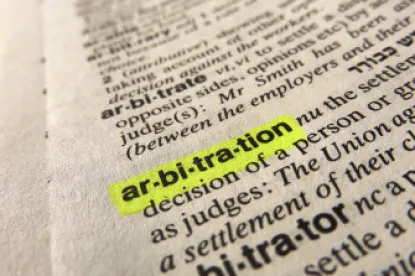Is an arbitration clause mandatory or permissive when it provides that either party to the contract may elect to submit a dispute to binding arbitration? What if the contract also provides that the right to arbitrate is not exclusive of any other rights that a party has to pursue legal action in an appropriate forum? Such an arbitration clause certainly sounds permissive. But courts have invested a lot of ink addressing the question, and (spoiler alert!) they have more or less consistently come to the conclusion that such a clause makes arbitration mandatory if any party chooses it.
At its core, a mandatory arbitration clause makes arbitration the exclusive dispute resolution method available to either party by contract, while a permissive clause requires arbitration only if a party elects it and no other party objects to it. This leads many litigants and their attorneys to assume that the use of the word “may” and/or a non-exclusivity statement in an arbitration clause makes it permissive, not mandatory.
Most American courts interpreting such language in the Federal Arbitration Act context, however, hold differently. By way of illustration, in Benihana of Tokyo, LLC v. Benihana, Inc., 2014 U.S. Dist. LEXIS 99933, at *22 (S.D.N.Y. July 22, 2014), Judge Engelmayer of the USDC for the Southern District of New York opined that when an agreement specifies that a party may submit a dispute to binding arbitration, it is merely providing that neither party is in fact required to initiate arbitration, but if any party prefers arbitration, that method of dispute resolution will be enforced. Thus, the initiating party may choose to litigate in court, mediate, or commence some other form of dispute resolution. However, if another party prefers to arbitrate, that choice should be enforced. Conversely, if the initiating party chooses to arbitrate in the first instance, the respondent may not move the dispute to a different forum. Thus, despite its permissive-sounding language, such an arbitration clause is in effect mandatory.
Two principal considerations inform this result. First, where a dispute or claim is arguably within the scope of an arbitration clause, there is a presumption in favor of its arbitrability. In this regard, the Supreme Court has said that “[t]he use of the permissive ‘may’ is not sufficient to overcome the presumption that parties are not free to avoid the contract’s arbitration procedures.” Allis-Chalmers Corp. v. Lueck, 471 U.S. 202, 204 n. 1 (1985). Second, the maxims of contract interpretation require giving substantive meaning to all provisions of an agreement. An interpretation requiring both parties’ post-contracting consent to arbitration is essentially superfluous because “parties can always submit a dispute to arbitration if both consent.” Travelport Global Distrib. Sys. B.V. v. Bellview Airlines Ltd., No. 12 Civ. 3484 (DLC), n. 2 (S.D.N.Y. Sept. 10, 2012). Moreover, parties do not typically memorialize unremarkable and non-binding advisory clauses in their contracts. Therefore, in order to give meaning to a sentence containing the word may in relation to arbitration, it is to be interpreted as must, unless both parties agree otherwise.
At this point you may be wondering about that other part of the hypothetical clause that says that arbitration is a non-exclusive remedy. Doesn’t that indicate permissiveness regarding arbitration? Not so, say the courts (again). The interpretation of that provision is really no different than the interpretation of the word may in an arbitration clause. It indicates, merely, that if both parties agree, they may pursue dispute resolution mechanisms other than arbitration.
So what does the word may mean in the context of an arbitration clause? It means that the parties may choose to resolve their dispute in a non-arbitration forum, but only if no party wants to arbitrate. If one party prefers to arbitrate, then may really does mean must.
Finally, note that this analysis only concerns U.S. law. Under English law, the interpretation of may, and the result, is typically the opposite. But that is a topic for another post.




 />i
/>i

